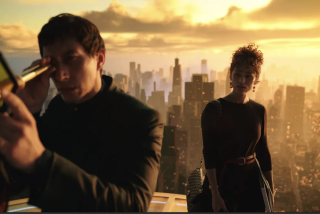More a cause than a must-see, ‘The Interview’ finally arrives in theaters
- Share via
Some came out of a sense of patriotic duty. Some came to see what all the fuss was about. Some just came in the hope of some laughs on a holiday.
Capping weeks of headline-grabbing tumult that rocked Sony Pictures to its core, frayed nerves and relationships in Hollywood, and reached all the way to the White House, moviegoers finally got their chance to see the Seth Rogen-James Franco comedy “The Interview” as it rolled into 331 independent movie theaters nationwide on Christmas Day.
Across the country, some theaters were boisterous and sold out, while at others the scene was more subdued, with attendance likely dampened by the fact that the film had been made available online the day before, giving audiences the option of watching it in the comfort of their own homes.
Originally conceived as a silly, over-the-top comedy rather than any sort of hot-button political satire, “The Interview” almost didn’t make it to theaters at all. On Dec. 17, Sony Pictures announced it was canceling the release of the movie — which centers on the assassination of North Korean leader Kim Jong Un — in the wake of a devastating cyberattack on the studio that was ultimately tied by U.S. officials to North Korea.
Following widespread criticism — including that of President Obama, George Clooney and many other notables — that the studio had caved to terrorism, Sony executives scrambled to broker eleventh-hour deals to distribute it via independent theaters and a handful of video-on-demand platforms, including YouTube and Google Play.
On Christmas morning, a crowd of about a dozen people milled outside the Sundance Sunset Cinemas in West Hollywood before an 11:45 a.m. show.
“I would have come anyway — I have nothing else to do,” said writer Jason Bargueno, 33, who was away from family and dog-sitting in the area. “But also I wanted to come and properly support it.”
Coming out of the theater after the screening, one moviegoer said she better understood why the film stirred up trouble.
“I think everyone in North Korea should see this movie — there’s truth in every joke,” said Courtney, 36, who said she didn’t want to provide her last name because of threats that had been directed against moviegoers by the hacking group calling itself Guardians of Peace.
Despite those earlier threats of Sept. 11, 2001-style attacks on theaters showing the film — threats that had prompted the nation’s largest theater chains to drop their plans to show the film — there was little evident concern about security at the Crest Theatre in Westwood, where the atmosphere was low-key at the first showing of the day at noon. There were no police cars outside the theater, and moviegoers weren’t searched upon entry.
Weezie Melancon, president of the Crest, said the theater contacted Los Angeles Police Department and Sheriff’s Department officials on Wednesday to inform them of plans to screen the film.
“They came in yesterday and before the show today and said they would be on the watch and would have a presence,” she said.
Like many theater owners showing the film, Melancon was grateful for the controversy around “The Interview.” “It’s always so quiet on Christmas — we were going to be closed,” she said. “So it’s cool to see so many people come out.”
Moviegoer Lynda Hayslett, who is of Korean descent, shrugged off any fears of violence. “North Korea always makes threats,” she said. “I don’t worry about it.”
At some theaters, the mood was festive and almost circus-like. One of the first showings in Los Angeles, a sold-out 12:30 a.m. screening at the Cinefamily theater on Fairfax Boulevard, drew camera crews, carolers, fans dressed as Uncle Sam — and, in a surprise appearance, co-directors Rogen and Evan Goldberg themselves.
“You are the best,” Rogen told the crowd. “We thought this might not happen at all.”
Rogen and Goldberg had been largely out of the public eye for more than a week since Sony first canceled the film. Having weathered a firestorm unlike any Hollywood has ever seen, the two were clearly relieved that audiences were getting to see the film on the big screen and eager to take a victory lap.
“If it wasn’t for theaters like this, and people like you guys, this literally would not be … happening,” Rogen said.
Sony had originally planned a wide Christmas Day release for the film in some 3,000 theaters, and initial expectations had been that it could easily pull in $20 million to $25 million in its opening weekend. It remains to be seen how much money the studio, which spent $44 million on the film’s production and millions more on its marketing — not to mention the still-untold millions in damage wrought by the hacking — will now be able to recoup from its patchwork release.
Sony has not released any revenue figures from the first day of on-demand viewings but the comedy was at the top of the film charts for YouTube and Google Play. With reviews decidedly mixed, analysts now estimate it could pull in $3 million to $4 million in its limited theatrical release over the holiday weekend, nowhere near the expected hauls for the other major films opening Christmas Day, including the World War II epic “Unbroken” and the musical “Into the Woods.”
Still, for many moviegoers, after all that had happened in its wild and noisy run-up, “The Interview” represented more than just another studio release. It had become something closer to a cause.
Former Sony employee Lauren Cole, who worked in the studio’s international television department in the 1990s, bought a ticket to the first showing of “The Interview” at the Crest.
“I didn’t want to see it before,” Cole said. “I thought Sony’s decision to cancel was the worst thing they could have done, so I said I would go see it if there was an opportunity.”
“It’s a basic issue of freedom of choice,” said Cliff Reston, 57, of Hollywood, who attended a showing at the Sundance Sunset Cinemas with his wife, Toni. “This is a movie I probably would have watched on-demand in a year — it’s not a genre that rises to the top for me. But once it became a cause célèbre, it seemed worth doing.”
Coming out of that same showing, Joseph Tintfass, who works in the film industry as a production designer, said he hadn’t expected much from the movie but, in the end, had found it “hilarious.”
“We shouldn’t let a dictator tell us what to watch,” he said.
More to Read
Only good movies
Get the Indie Focus newsletter, Mark Olsen's weekly guide to the world of cinema.
You may occasionally receive promotional content from the Los Angeles Times.













